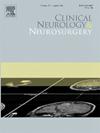Genetic perspectives on transient global amnesia: A narrative review
IF 1.6
4区 医学
Q3 CLINICAL NEUROLOGY
引用次数: 0
Abstract
Transient global amnesia (TGA) is a clinical syndrome characterized by the sudden onset of anterograde amnesia that can last up to 24 h, in the absence of other neurological symptoms. The pathophysiology of TGA is still unknown and comprehensive studies exploring the genetic basis of TGA are lacking. The primary objective of this review is to examine the incidence and characteristics of familial TGA. A secondary objective is to identify any genes that may be associated with the condition. A literature search of Medline and Embase identified 19 relevant articles, including 6 prospective or retrospective cohort studies, 12 case reports/case series, and one study investigating a single nucleotide polymorphism in TGA patients. Cohort studies included 1648 TGA patients, with 55 familial cases reported, and showed no significant associations. Nevertheless, available data suggest that patients with familial TGA frequently exhibit migraine-related symptoms, with clinical characteristics comparable to those observed in sporadic TGA cases. Case reports and case series described 35 familial cases, further supporting the existence of multiple familial TGA cases -an observation unlikely to be coincidental given the rarity of this condition. Migraine appears to be the most common comorbidity in familial TGA, rather than ischemic risk factors. Finally, a genetic analysis of the Val66Met polymorphism in the brain-derived neurotrophic factor gene, implicated in memory and hippocampal function, was performed in 98 patients and found no association with TGA. In conclusion, although no strong genetic associations have been identified to date, familial clustering suggests a potential heritable component in TGA pathogenesis.
短暂性全身性健忘症的遗传学观点:叙述回顾
短暂性全身性遗忘症(TGA)是一种临床综合征,其特征是在没有其他神经系统症状的情况下,突然发作的顺行性遗忘症可持续24 h。TGA的病理生理机制尚不清楚,缺乏对TGA遗传基础的全面研究。本综述的主要目的是研究家族性TGA的发生率和特征。第二个目标是确定任何可能与疾病相关的基因。在Medline和Embase检索文献,共检索到19篇相关文章,包括6篇前瞻性或回顾性队列研究,12篇病例报告/病例系列研究,1篇TGA患者单核苷酸多态性研究。队列研究包括1648例TGA患者,报告了55例家族性病例,未发现显著相关性。然而,现有数据表明,家族性TGA患者经常表现出偏头痛相关症状,其临床特征与散发性TGA病例相似。病例报告和病例系列描述了35例家族性病例,进一步支持存在多例家族性TGA病例——鉴于这种情况的罕见性,这一观察结果不太可能是巧合。偏头痛似乎是家族性TGA中最常见的合并症,而不是缺血性危险因素。最后,对98名患者进行了脑源性神经营养因子基因Val66Met多态性的遗传分析,发现与TGA没有关联。总之,尽管到目前为止尚未发现强烈的遗传关联,但家族聚类表明TGA发病机制中存在潜在的遗传成分。
本文章由计算机程序翻译,如有差异,请以英文原文为准。
求助全文
约1分钟内获得全文
求助全文
来源期刊

Clinical Neurology and Neurosurgery
医学-临床神经学
CiteScore
3.70
自引率
5.30%
发文量
358
审稿时长
46 days
期刊介绍:
Clinical Neurology and Neurosurgery is devoted to publishing papers and reports on the clinical aspects of neurology and neurosurgery. It is an international forum for papers of high scientific standard that are of interest to Neurologists and Neurosurgeons world-wide.
 求助内容:
求助内容: 应助结果提醒方式:
应助结果提醒方式:


